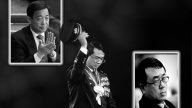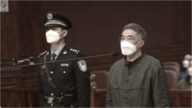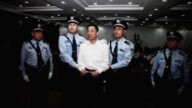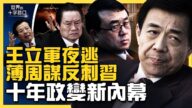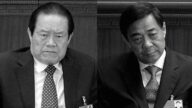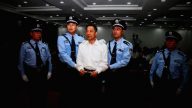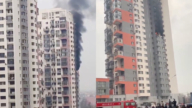【新唐人2013年10月04日訊】一向被公認為是不公開透明、暗箱操作的中國+司法系統,竟然破天荒的在全國席捲起一股「微博」風。儘管看起來是在展示所謂的透明度,但外界紛紛猜測中共葫蘆裡賣的是甚麼藥?。對於喉舌媒體宣傳的「微博庭審」的目的是為了推動大陸司法公開,法律界人士則多數抱以否定和懷疑態度。有評論分析指出,當局的動作不過是一種政治宣傳手段。
前重慶市委書記薄熙來案審判結束後,儘管民間輿情認為整個審判是一場精心設計的政治秀,但濟南中院仍然因「微博直播」賺足了眼球,引得其他法院紛紛效仿,截至9月底,大陸已經有955個法庭在網上建立了新浪微博賬戶。
儘管中共媒體大肆宣揚各地法院開設微博、用微博「直播」庭審的做法意表明中國司法正在向著開放、透明、互動的方向邁進,但中國法律界的律師和學者們對此卻並不讚同。
大陸維權律師唐荊陵:「我覺得它這種開微博呢,是為了對現在輿論形態的變化有所反應,但是我覺得它這個離司法公開的距離還很遠的,因為司法公開更多的是屬於一種政治形態上的轉變,在我們現有的政府形態下,我認為它做不到真正的司法公開。」
據統計,目前大陸31個省份中,至少有17個省份出現了「微博庭審」的案例,但從案件類型上看,大多是一些案情清晰、爭議不大的普通案件,如醫療糾紛、債務糾紛、離婚案、搶劫案等,但一些涉及民生民利、維權以及大眾極為關心的重大問題,反而沒有被公開。因此,民間將「微博庭審」總結成了一句話:「你播的我不想知道,我想知道的你不播。」
大陸律師劉曉原:「它的目的就是讓社會認為它那個庭審是公開的嘛,它說我們用『微博直播』了嘛,讓網路上能夠看到更多的消息。那麼現在網路技術很高,你可以用網路視頻的方式直播嘛!因為它『微博直播』的話畢竟是內容有限,它又可以控制,有些內容可能像薄熙來那個案件一樣,有些內容實際上沒有直播出來,它是有選擇性的。」
最近,中共最高法院下令禁止律師在個人微博上透露案件審理過程,被法律界認為是矛盾的司法解釋,既然法院可以微博「直播」,為甚麼律師卻不可以談論,當局究竟在怕甚麼?律師們擔心,法院只在對自己有利的情況下有選擇性的公開案件,而不是從滿足公民知情權的角度確定播報內容。
唐荊陵:「我是覺得它跟中共這個體制本來是一個黑箱體制有很大關係,它不讓人傳遞消息,是擔心一旦出現一些它難以管控的言論哪,或者是動作,比如說,可能在庭審的過程中,它說出來一個很厲害的話,假如說像薄熙來審判的時候,它揭出了一個很大的黑幕,這些信息傳出去,它就不可能再收回了。」
有知情人指出,濟南中院庭審薄熙來時「直播」的微博消息,都是經過法院工作人員精心篩選的,法院方面很小心地抹掉了其中的政治要素。包括薄熙來說,他在處置王立軍逃亡事件時,得到了中共某高層下達的「六條指示」,以及薄熙來在法院判處他終身監禁時,大聲咆哮抗議的場面。
唐荊陵:「我估計他們不太公開這種真正有影響的案件的審理,更多的考慮是為了維護這種黑幕的政治吧!」
《美國之音》引用批評者的話指出,中共當初作出這種所謂的透明性決策的本意,無非是用透明性作為煙幕彈,用來攪渾水,恰恰展示出了中共當局所謂的透明性和司法公開性的局限性或欺騙性。
採訪編輯/張天宇 後製/鍾元
Limitations And Deceptive Nature Of Communist China’s
Judicial “Transparency"
China’s judicial system has long been recognized as a
non-transparent and corrupt operation.
Now there is an unprecedented wave of “Life trials on
Weibo microblog".
Although this move may only show transparency on the
surface, outsiders continuously speculated what tactic the
Chinese Communist Party (CCP) is playing.
The media propaganda on the “Weibo" issue is to push
forward transparency of the judicial system.
Legal experts are clinging to denial and doubting attitudes.
Analysts point out that the move is only political propaganda.
After Bo Xilai’s trial finished, most public opinion believed
that the trial was a well-designed political show.
Jinan court put Bo’s trial transcript on Weibo which has
attracted enough viewers. Other courts are following up.
By the end of September, 955 courts had
set up Sina Weibo accounts.
The media reported that courts in different cities opened
Weibo accounts.
They used it to update the trial transcript, which is trying to
show the judicial system is moving to a positive way.
However, legal experts have different views.
Tang Jingling, activist lawyer: “I think they opened a
Weibo account to respond to current public opinion.
They have a long way to go for judicial transparency,
because judicial transparency is a part of political changes.
Under the current system, I think they can’t
achieve real transparency."
According to statistics from 31 provinces, at least 17 of
them have implemented “Life trial on Weibo".
Most of the cases are simple cases with clear documents,
with little dispute.
These types are medical malpractice, debt disputes,
divorces, robberies etc.
Yet some of the cases involving people’s livelihoods,
human rights abuses and public concerns haven’t been
posted on Weibo by the courts.
So people summarized the move: “What you have posted,
we don’t want to know.
What we want to know, you haven’t posted."
Lawyer Liu Xiaoyuan: “Their purpose is to let public
recognize that their trials are open.
So they will say they posted updated trial transcripts
and more information can be viewed online.
By posting information on Weibo, they can limit the
contents, and control it as well.
However, some contents may be similar to Bo Xilai’s case,
where some details are covered up, it’s selective transparency."
Recently, the Supreme Court issued an order to ban lawyers
from revealing the case procedures on Weibo.
People said it contradicted the transparency policy.
Nevertheless, courts can post procedures on Weibo, so
why can’t the lawyers talk about it?
Lawyers worried that the courts’ selective posts of trial details
are only if it is good for them, rather than meeting citizens’
rights of information.
Tang Jingling: “As the CCP’s system is a corrupt operation
system, it doesn’t allow the passing of messages.
The CCP is worried that speech or action is out of control.
For example, in the trial, if someone said something sensitive,
like Bo Xilai disclosing a major corruption dark scene and
the news is leaked out, it is impossible to recover it."
Insiders point out that Jinan court posted Bo Xilai’s trial and
transcripts were all carefully censored by court staff.
The court deleted some sensitive political contents:
e.g. Bo testified that when Wang Lijun escaped, Bo received
“six guidance" from a higher up level to deal with the incident.
e.g. Bo shouted loudly in court when he heard
he was given a life imprisonment sentence.
Tang Jingling: “I speculate that they won’t open such sensitive
cases completely.
They consider more on how to maintain
the political dark scenes."
Voice of America cited critics that the CCP’s initial purpose
to implement so-called “transparency is just a tactic.
On the contrary, it reflects the limitation and deceptiveness
of the CCP’s so-called judicial transparency.


